Tehillim is a composition by American composer Steve Reich, written in 1981.

Robert Southwell, SJ, also Saint Robert Southwell, was an English Catholic priest of the Jesuit Order. He was also a poet, hymnodist, and clandestine missionary in Elizabethan England.
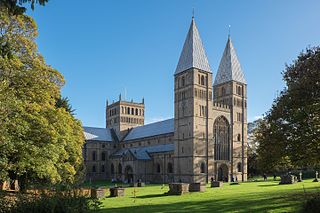
Southwell Minster, formally the Cathedral and Parish Church of the Blessed Virgin Mary, is a Church of England cathedral in Southwell, England. The cathedral is the seat of the bishop of Southwell and Nottingham and the mother church of the diocese of Southwell and Nottingham; it is governed by a dean and chapter. It is a grade I listed building.

A Ceremony of Carols, Op. 28 is an extended choral composition for Christmas by Benjamin Britten scored for three-part treble chorus, solo voices, and harp. The text, structured in eleven movements, is taken from The English Galaxy of Shorter Poems, edited by Gerald Bullett. It is principally in Middle English, with some Latin and Early Modern English. It was composed in 1942 on Britten's sea voyage from the United States to England.

The following lists some references to the Holocaust-era Jewish diarist Anne Frank in popular culture.
Eric Harding Thiman was an English composer, conductor and organist. The surname is pronounced 'tea-man'. By 1939 he was considered one of the leading non-conformist organists in England. His choral and educational music is still performed today.

Psalm 150 is the 150th and final psalm of the Book of Psalms, beginning in English in the King James Version: "Praise ye the LORD. Praise God in his sanctuary". In Latin, it is known as "Laudate Dominum in sanctis eius". In Psalm 150, the psalmist urges the congregation to praise God with music and dancing, naming nine types of musical instruments.

Psalm 134 is the 134th psalm from the Book of Psalms, a part of the Hebrew Bible and the Christian Old Testament, beginning in English in the King James Version: "Behold, bless ye the LORD, all ye servants of the LORD". Its Latin title is "Ecce nunc benedicite Dominum". It is the last of the fifteen Songs of Ascents, and one of the three Songs of Ascents consisting of only three verses. The New King James Version entitles this psalm "Praising the Lord in His House at Night".

Psalm 133 is the 133rd psalm of the Book of Psalms, beginning in English in the King James Version: "Behold, how good and how pleasant it is for brethren to dwell together in unity". In Latin, it is known as "Ecce quam bonum". The psalm is one of the fifteen Songs of Ascents, and one of the three Songs of Ascents consisting of only three verses.

Psalm 131 is the 131st psalm of the Book of Psalms, beginning in English in the King James Version: "Lord, my heart is not haughty". In Latin, it is known as "Domine non est exaltatum cor meum". In the slightly different numbering system used in the Greek Septuagint version of the bible and in the Latin Vulgate, this psalm is Psalm 130.
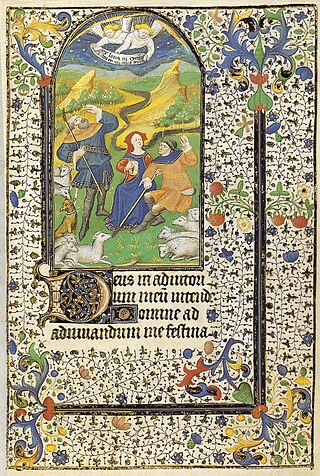
Psalm 70 is the 70th psalm of the Book of Psalms, beginning in English in the King James Version: "Make haste, O God, to deliver me". The Book of Psalms is part of the third section of the Hebrew Bible, and a book of the Christian Old Testament. In the slightly different numbering system used in the Greek Septuagint and Latin Vulgate translations of the Bible, this psalm is Psalm 69. In Latin, it is known as "Deus, in adiutorium meum intende".

Psalm 75 is the 75th psalm of the Book of Psalms, beginning in English in the King James Version: "Unto thee, O God, do we give thanks". The Book of Psalms forms part of the Ketuvim section of the Hebrew Bible and part of the Christian Old Testament. In the slightly different numbering system of the Greek Septuagint version of the bible, and in its Latin translation, the Vulgate, this psalm is Psalm 74. In Latin, it is known as "Confitebimur tibi Deus". It is one of the psalms of Asaph.

Psalm 81 is the 81st psalm of the Book of Psalms, beginning in English in the King James Version: "Sing aloud unto God our strength". In the slightly different numbering system used in the Greek Septuagint and Latin Vulgate translations of the Bible, this psalm is Psalm 80. In Latin, it is known as "Exultate deo adiutori nostro". It is one of the 12 Psalms of Asaph. Its themes relate to celebration and repentance. In the New King James Version its sub-title is "An Appeal for Israel's Repentance".

Psalm 96 is the 96th psalm of the Book of Psalms, a hymn. The first verse of the psalm calls to praise in singing, in English in the King James Version: "O sing a new song unto the Lord". Similar to Psalm 98 and Psalm 149, the psalm calls to praise God in music and dance, because he has chosen his people and helped them to victory. It is one of the royal psalms praising God as the King of His people.
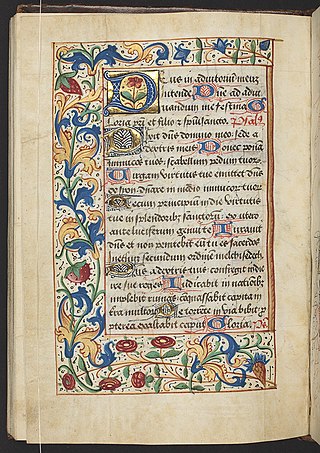
Psalm 110 is the 110th psalm of the Book of Psalms, beginning in English in the King James Version: "The LORD said unto my Lord". In the slightly different numbering system used in the Greek Septuagint and Latin Vulgate translations of the Bible, this psalm is Psalm 109. In Latin, it is known as Dixit Dominus. It is considered both a royal psalm and a messianic psalm. C. S. Rodd associates it with the king's coronation.

Utrecht Te Deum and Jubilate is the common name for a sacred choral composition in two parts, written by George Frideric Handel to celebrate the Treaty of Utrecht, which established the Peace of Utrecht in 1713, ending the War of the Spanish Succession. He composed a Te Deum, HWV 278, and a Jubilate Deo, HWV 279. The combination of the two texts in English follows earlier models. The official premiere of the work was on 13 July 1713 in a service in St Paul's Cathedral in London.
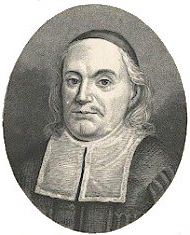
Ich hab in Gottes Herz und Sinn, BWV 92, is a cantata by Johann Sebastian Bach for use in the Lutheran service. He composed the chorale cantata in Leipzig for Septuagesimae and first performed it on 28 January 1725. It is based on the hymn "Ich hab in Gottes Herz und Sinn" by Paul Gerhardt (1647), and is the only chorale cantata Bach based on a hymn by Gerhardt.
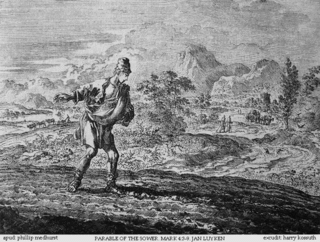
Leichtgesinnte Flattergeister, BWV 181, is a church cantata by Johann Sebastian Bach. He composed it in Leipzig for Sexagesima and first performed it on 13 February 1724.
Anne Southwell [née Harris], later called Anne, Lady Southwell, was a poet. Her commonplace book includes a variety of works including political poems, sonnets, occasional verse, and letters to friends.
O clap your hands is an anthem in English for choir and organ by John Rutter. He composed the setting of verses from Psalm 47 in 1973 for a four-part choir and organ, and also made a version with orchestra. It was first published in 1973. Later, Rutter included it in Psalmfest, a collection of nine psalm settings.